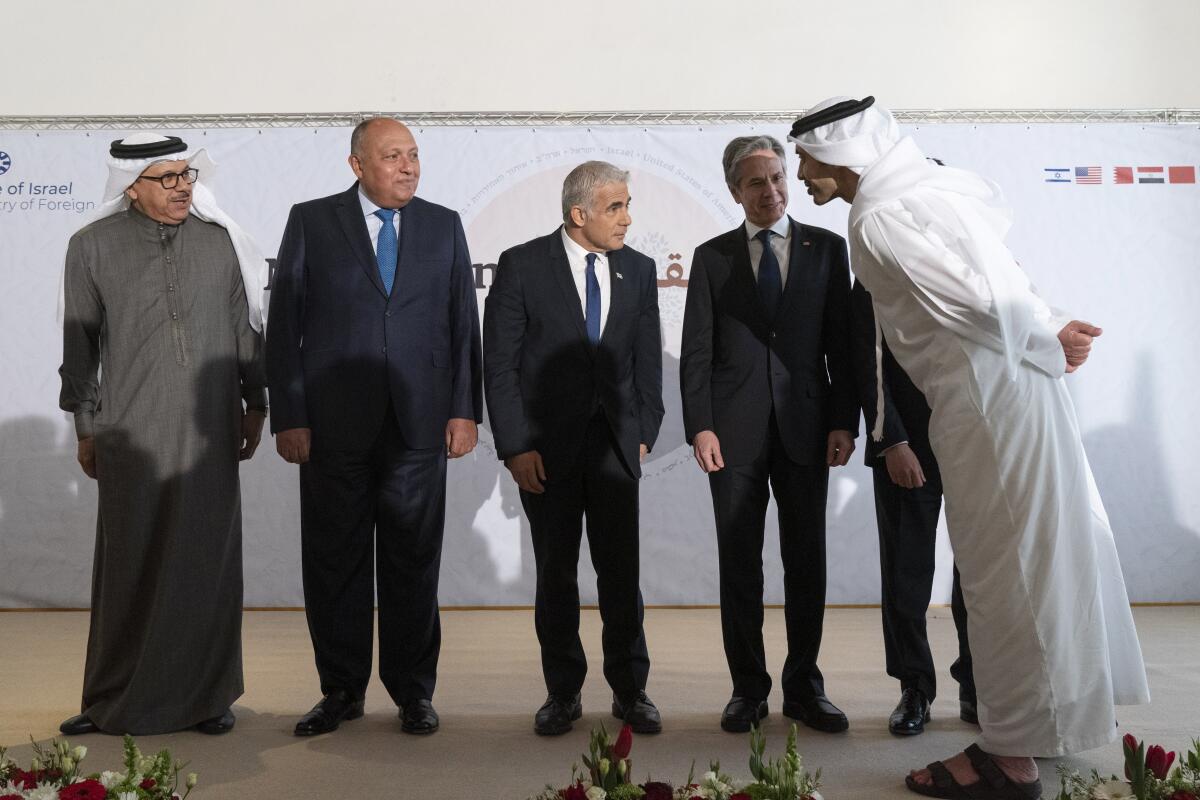Why is Biden’s Middle East trip even necessary?

- Share via
Over the last 30 years, American presidents have visited the Middle East a total of 56 times. President George W. Bush holds the record with 20 trips. Presidents George H.W. Bush and Donald Trump traveled there the fewest times — four visits each. There were often important reasons for these trips, whether it was visiting troops in the field, forging peace, soliciting support to fight terrorism or shoring up the American-led order in the region.
In President Biden’s case, however, it remains unclear why he is traveling to Israel, Palestine and Saudi Arabia this week. During the 2020 campaign, his advisors made it clear that a Biden administration would de-emphasize the Middle East. Once in office, the president declared that American values would be central to his foreign policy.
His visit to the region this week undercuts both those claims. Making matters worse, it is hard to understand why this trip is even necessary.
Among the items on the president’s agenda while he is in Saudi Arabia is to advance regional security and cooperation. Yet the U.S. is playing catch-up on this issue. Saudis, Emiratis, Bahrainis (and to a lesser extent, Egyptians and Jordanians) have already forged a consensus on regional threats with their former adversaries the Israelis. And they’ve done it not because of the United States but, rather, despite it.
Washington has some ground to make up. Its previous efforts to promote democratic change in the region — in Iraq, Egypt, Palestine, Libya and Afghanistan, among other places — fueled fears among its partners that heavy-handed U.S. policies were advancing the political prospects of Islamists. The Arab states and Israel also recoiled at American efforts to forge a new relationship with Iran through the 2015 nuclear deal.
Today, Israel and the Arab leaders are willing to have the U.S. lead, but they’re looking for more than just words from President Biden. They’d like to see an end to the Iran negotiations and they’re eager for the opportunity to purchase American weapons.
However, a new security commitment that includes weapons sales will require congressional assent — and Saudi Arabia, the UAE and Egypt are unpopular among Democrats for their terrible track records on human rights and other transgressions. As for Iran, progressives on Capitol Hill still want a return to the nuclear deal despite Iran’s obstreperousness in negotiations and destabilizing activity in the region.
Weapons sales and security guarantees for Saudi Arabia, in particular, may become more palatable to Congress as Israel becomes further normalized into the region. Yet that may get Biden only so far given the changing nature of the politics of Israel within the Democratic Party. The bipartisan consensus that afforded the Israelis unquestioned support in Congress for decades has begun to fray in recent years.
In any event, Israel’s integration seems to have taken on a logic of its own separate from whatever diplomatic effort the United States is expending on the issue. Consider, for example, the Negev Summit in March. Although Secretary of State Antony Blinken took part, the meeting of Israeli, Bahraini, Emirati, Moroccan and Egyptian foreign ministers happened not because the United States pushed it, but because regional actors wanted to build on existing ties and forge new ones.
That is, of course, a positive development.
There’s speculation that while in Saudi Arabia, President Biden may secure a pledge from the Saudis to open up their airspace to Israeli airliners traveling to Asia, which would be another important step toward regional peace. Yet additional steps toward normalization between Israel and Saudi Arabia will require progress on the conflict between Israelis and Palestinians — an issue the White House has evinced little interest in.
When the president visits Bethlehem and meets Palestinian leader Mahmoud Abbas, he will express his support for a two-state solution — but this is hardly an auspicious moment for a meeting. The Palestinians are angry over the way the Biden administration has handled the killing of Shireen Abu Akleh, a Palestinian American journalist. Rather than conduct a thorough investigation into what happened — leveraging the expertise of the FBI — the State Department released a transparently weaselly statement that suggested Israeli soldiers had fired the gun that killed Abu Akleh, but also made clear that the United States could not draw a definitive conclusion about culpability.
The Bethlehem visit would have been the trickiest part of Biden’s trip if not for his visit to Saudi Arabia — a country he vowed to make a “pariah” during his campaign. Now, however, driven by low poll numbers and high gas prices, the president has been doing everything possible to ease Americans’ pain at the gas pump. That means a meeting with the Saudi leadership, including Crown Prince Mohamed bin Salman, during which Saudi Arabia’s ability to put more oil on the market to bring down the price of gas will be discussed.
As the world now knows, the crown prince is responsible for the murder of journalist Jamal Khashoggi and for the Saudi intervention in Yemen’s civil war, which has had devastating humanitarian consequences. Having now compromised his own professed emphasis on American values, President Biden may learn that the Saudis do not have much capacity to produce more oil at the moment.
In all, it is not an opportune moment for the president to go to the region.
Biden generally shines when doing business abroad. But in the Middle East, he risks looking like he was slow to understand regional dynamics, insincere and weak — the opposite of what a presidential trip is supposed to achieve.
Steven A. Cook is senior fellow for Middle East and Africa Studies at the Council on Foreign Relations.
More to Read
A cure for the common opinion
Get thought-provoking perspectives with our weekly newsletter.
You may occasionally receive promotional content from the Los Angeles Times.









